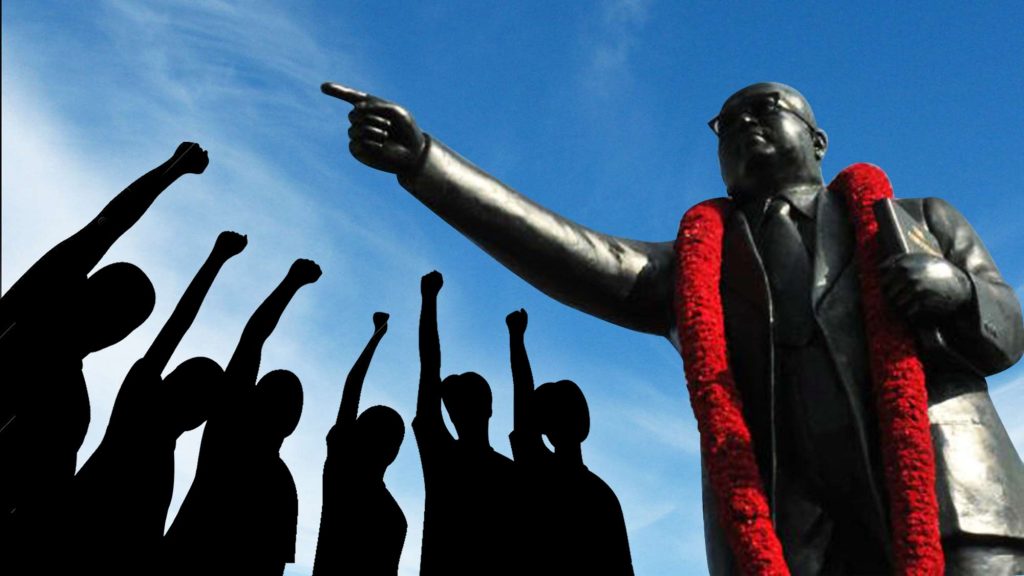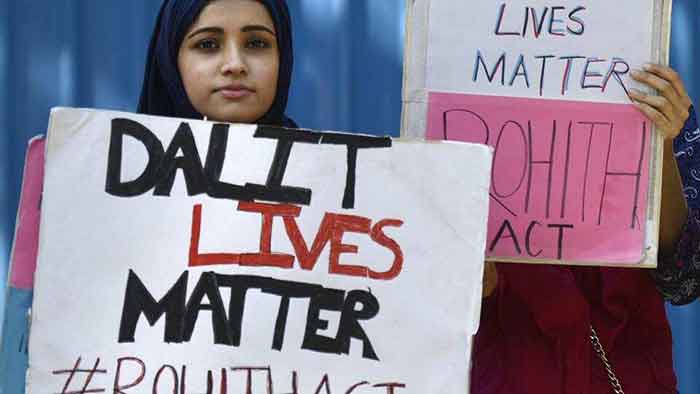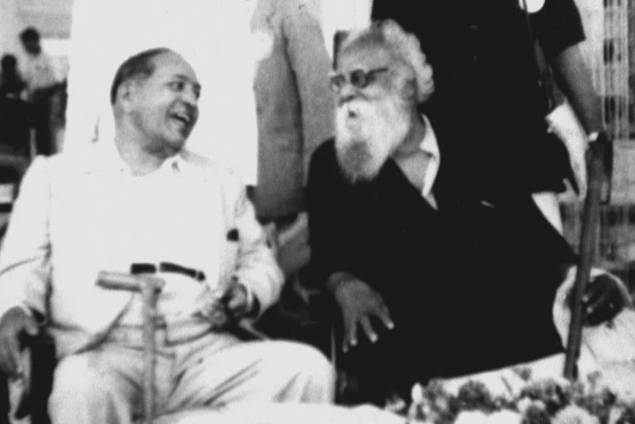
[Sunil Kashyap, a staff writer at The Caravan, spoke with Dr Indu Chowdhary, an assistant professor in Banaras Hindu University’s English Department, founder of Bahujan Shakti Mission, regarding Bahujan Movement. Excerpts:]
Sunil Kashyap: What is the Bahujan Shakti Mission? What kind of work is it doing?
Indu Choudhary: The name is self-explanatory. Kanshi Ram taught us the word ‘Bahujan.’ Scheduled Castes, Scheduled Tribes, Other Backward Classes, and minorities are about eighty five percent of the population, if they come together and realise their power, they will be unstoppable, like a giant elephant. This is what Kanshi Ram tried to do. Taking inspiration from that, we have named the organisation Bahujan Shakti Mission. This is a mission to make the common man aware of their power again, to remind them of the ideologies of great men, the power of their vote, and to make the youth economically, educationally and socially prosperous. This was needed because after the lockdown and demonetisation, a large section of us have become even poorer. Demonetisation and lockdown have had an adverse impact on the education of the children in our classes.
In the political scene, some people are relentlessly capturing power. Where are our votes going? People vote in favour of different political parties but all votes seem to be shifting towards one party. What sort of a situation is this? How to study this? In the villages, voters are still equipped with the thoughts of Kanshi Ram but the society which Kanshi Ram created is drifting apart, slowly. That’s probably why it’s not getting converted into votes. The empowerment within castes, created by Kanshi Ram, is coming to an end. The castes within castes, once unified, used to produce their own leaders but now these leaders have merely become the leaders of their own caste. They could not become leaders of the entire Bahujan Samaj because caste ideology is still flourishing. In such times, we have to unite society. We will not be able to work in the whole of India but we will definitely work in some areas and give it better direction.
Kashyap: How do you see the Bahujan movement after BR Ambedkar?
Choudhary: I have not seen both, Babasaheb [Ambedkar] and Kanshi Ram. But Kanshi Ram brought Babasaheb and his ideas to life. He said that one could judge society by the progress of women in it. Today, it is said that in the olden times women had a lot of respect. What kind of respect was it? Talking about the Bahujan movement, in a way, women had an important role in it. If a woman comes out, then the whole family joins her. Kanshi Ram placed his entire leadership on the shoulders of a woman [Mayawati, popularly referred to as Behenji, has been the president of the Bahujan Samaj Party since 2003].
Slowly, patriarchy is trying to dominate, not only in Uttar Pradesh but also in other states. The most important role in this mission is that of women. Then there is the youth. We don’t want aggressive youth, nor do we want agitated youth. Those who are studying should focus on their studies and others should continue with work as usual. Being overly agitated and constantly hitting the road will not do everything. The movement should be united like the one which took place on 2nd April [2018, when several Dalit organisations called for a Bharat Bandh, to protest a Supreme Court ruling that diluted the provisions of the Scheduled Caste and Scheduled Tribe (Prevention of Atrocities) Act of 1989. The ruling was reversed in October 2019]. Even without any organisational association, it showed an organised form of Bahujan Samaj. Our mission needs movements like this.
Kashyap: What are some of the challenges faced by the Bahujan movement today?
Choudhary: Today, organisation is the biggest challenge in front of the Bahujan movement. Our society is already divided by caste. Everyone is making himself the national president and is not ready to sit with others. Some youth organisations that exist are only getting entangled with the police and the administration on every small thing, twirling empty moustaches. Youth should be well-equipped with the Bahujan ideology. They should be educated, and have strength to stand in front of anyone and talk; talk according to the law.
Another problematic thing is, as many Bahujan Samaj organisations were formed, they created a separate women’s wing. You are not able to get yourself out of the double hierarchy system, which means that patriarchy will stay within the organisation as well. What do we want to prove by creating a separate wing of women in our organisations? What is the need? Why don’t you give them the main responsibility in your organisation?
Kashyap: There is a Bharatiya Janata Party government at the centre and in Uttar Pradesh. How does this impact the Bahujan Samaj?
Choudhary: It doesn’t matter whose government it is, if your ideology is strong. If your ideology is strong, then you will always be strong. Today, Bahujans are getting weak because their ideology has weakened. They have mixed it up. This is the era of pseudo-Ambedkarism and it is dangerous. The ideology which is contradictory to Kanshi Ram’s is called Manuwadi ideology. You cannot take both along. Kanshi Ram talked about how the caste order and social distinctions should be eradicated. What is that distinction based on? It is based on the Varna system. Babasaheb tried to end this superstition and hypocrisy; he failed. Then he made 22 vows, before adopting Buddhism. It was simple, if you want to align with this ideology, then you have to break away from that ideology.
The generation that was the first to adopt [Ambedkarite] Buddhism gradually died out. It is the third generation now. And this generation is watching everything through media and television, and somehow, that [Manuwadi] ideology starts spreading. I’ll give you a small example, the festival of Rakshaban-dhan. According to Babasaheb, we should be free from the belief of every thread. But by tying some kind of thread, you are following both types of ideologies. I have seen on Facebook, that many people celebrate Holi. But if you know your history then you will never congratulate anybody on that festival. If you have read your history then you will easily connect it.
Kashyap: Today, popular culture is created through social media and many other mediums. How do you see this?
Choudhary: The Ambedkarite movement has also spread rapidly due to popular culture in the last seven to eight years. And nowadays, people standing with Babasaheb are found in every movement. Whether they believe in him or not, our movement has also become a part of popular culture. But our preachers, who were prepared by Kanshi Ram, because they did not get importance or they have become old or for some other reason, have stopped setting up cadre camps. Backward caste people are unaware of their history. Jotiba Phule, Shahu Ji Maharaj, Periyar, they all belonged to a backward society.
The first reform movements that started were led by backward society, but we have not been able to make that popular. Kanshi Ram tried, he would organise cultural fairs. What happens when you see the photos of your great men, when you see swings with their names? Slowly, they seep into the lives of our children. Now, we have placed politics on a higher pedestal and movements have been left far behind. Ambedkar’s ideas were in the first two generations and did not seep through to the third. Now, this third generation is influenced by what is ‘trending.’ Ambedkar’s ideology in the house and another ideology in the society.
Kashyap: The Rashtriya Swa-yamsevak Sangh (RSS) is also working with the Bahujans. What kind of challenge does this pose for the Bahujan movement?
Choudhary: Everyone has the freedom to work, we cannot stop them. We need to find what lacks within ourselves. Now that Kanshi Ram is gone, many people with his ideology are also gone. The second generation was divided into multiple organisations. Now, the third generation does not have an ideology. They are faced with a challenge. Is someone right because they are more visible? This is the challenge for us.
Kashyap: BJP leaders often eat food at the homes of people from the Dalit community, during elections, and call it social harmony. The party says that they made a Dalit man, and then an Adivasi woman, as the president. What do you think about this?
Choudhary: We welcome the fact that they made the people of our classes the president. But calling them a Dalit or Adivasi president is unconstitutional. The post of president is beyond every caste and above every religion, caste and society. You insulted the Constitution first. Secondly, you insulted your presidency. We will see when they make a prime minister from these classes.
The word harmony itself seems unconstitutional to me. Equality is equality, justice is justice and there is a fraternity. What does harmony mean? I look at it this way, they want to maintain that system, they want you to stay in it, and you are getting some rights while they enjoy the power. This is the meaning of their harmony. If they eat by coming to our homes, why don’t they invite us to their homes? They will have a mass dinner, make khichdi and invite you for dinner. The second thing is, if you are trying to show that you are coming to our house to eat, you are trying to humiliate us. The reason that they come and eat food in our houses is that they want to force us to come to them for votes.
Kashyap: Kanshi Ram had formed a political party, the BSP and a social organisation, the All India Backward and Minority Communities Employees Federation, or BAMCEF. Are they no longer living up to their ideals? What do think of Mayawati’s politics?
Choudhary: Kanshi Ram was a man of scientific thinking. He focused on all aspects of organisation—made BAMCEF for the people who had jobs and money, and formed BSP as a political party. The people of the village wanted to fight but people with money and jobs said, “We cannot come forward and agitate and our job is in danger.” His Bahujan Sangathan ran a newspaper, to equip people with the ideology, to allow ideas to reach our people.
Kanshi Ram’s work is visible on the ground. But today, its propaganda has become absolutely zero. No person is going out and campaigning;only organisations are being promoted a lot. We have seen how, politically, we have been cleared out. Kanshi Ram used to say that politics should never stop, and the pace of social change should never stop. And that pace is slowly dropping. When people focus on the ideology and not on the person, then we will be strong politically also. The biggest task in this era is to re-establish the ideology.
Behenji is an icon. The crowd at her rallies is enough to prove that her craze is still there. Her craze will continue in the times to come. We also thought that the top-down approach will suffice and we will not have to work on the ground. But the movement is becoming weak because of this.
Kashyap: How do you see the politics of Uttar Pradesh in terms of Bahujan consciousness?
Choudhary: In Uttar Pradesh, after Kanshi Ram’s death, many parties are still working on his ideology. Kanshi Ram brought a complete earthquake in politics. We have to bring that earthquake back. And the future of Bahujan politics can never end because this ideology will never die. If one Kanshi Ram goes, another will be born; if not now, later. We have to keep this seed alive in our youth. We have to make our ideology a part of pop culture.
Kashyap: Will you join politics in the future?
Choudhary: So far, I have not thought of it. You have to do politics with ideology and we can never compromise with ideology. If I have to do politics in future, it will be purely ideology politics.
[Courtesy: Caravan magazine]
Frontier
Vol 55, No. 36, Mar 5 – 11, 2023












































